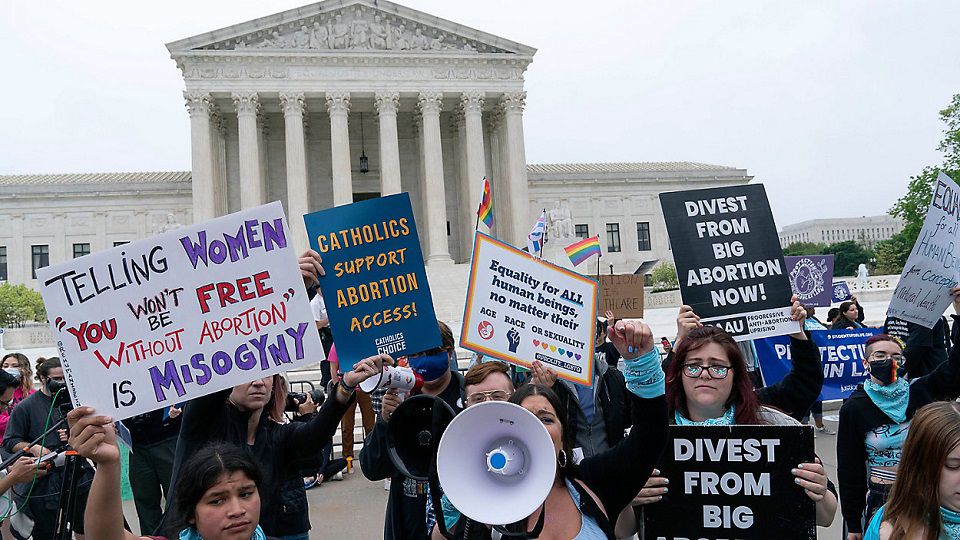Within hours of reports that a leaked document shows the Supreme Court may overturn abortion rights, political operatives in Maine cast the decision as a major fall election issue.
“Reports saying the Supreme Court is planning to overturn Roe v. Wade make one thing clear: the future of abortion rights in Maine is on the ballot this November,” Maine Democratic Party Chairman Drew Gattine said in a statement.
Late Monday night, POLITICO published a court opinion written by Justice Samuel Alito and backed by four other justices that would overturn the 1973 Roe v. Wade decision that guarantees a woman’s right to an abortion. The Supreme Court confirmed Tuesday the document is authentic, but could change before the final ruling is issued.
Across the country, states have been passing laws recently to challenge the decision, bolstered by a conservative majority court.
But in Maine, there are no anti-abortion laws that would kick-in if Roe is overturned. Maine is one of 16 states to protect the right to an abortion, according to the Washington Post.
The Planned Parenthood Maine Action Fund said it did not anticipate “immediate changes to abortion laws in Maine” if the leaked decision is what the court decides.
“But election matter,” Nicole Clegg, senior vice-president of public affairs, said in a statement. “If a majority of anti-abortion politicians take control of the legislature or the Blaine House, they could pass laws restricting or even banning abortion.”
Mainers will go to the polls in November to choose a governor and fill all 186 seats in the state Legislature. Democrats currently control both the House and Senate and Gov. Janet Mills, a first term Democrat, is running for reelection.
Mills put out a statement late Monday night saying as long as she’s governor, she will fight to protect abortion rights. Mills is the state’s first woman governor and has expanded access to abortion during her tenure.
“There are countless women across Maine and America who are worried right now — worried that their right to a safe and legal abortion is near its end; worried about what that uncertainty could mean for their health, their lives, and their futures; and worried about what this decision says about the values of our nation and their place in it,” she said.
As governor, Mills signed a law that allows physician assistants and advanced practice registered nurses to perform abortions and a separate bill to require private and public insurance providers to cover abortion care.
“Well, I want to be very clear: unlike an apparent majority of the Supreme Court, I do not consider the rights of women to be dispensable,” she said. “And I pledge that as long as I am governor, I will fight with everything I have to protect reproductive rights and to preserve access to reproductive health care in the face of every and any threat to it — whether from politicians in Augusta or Supreme Court justices in Washington.”
Former Gov. Paul LePage, a Republican who will face Mills in the fall, said in a statement that he supports current federal policy to prohibit the use of taxpayer funds for abortion “except in cases of rape, incest or when the mother’s life is in danger.”
But he appeared to leave the door open to new restrictions at the state level, depending on what state lawmakers send to his desk.
“Maine state law already prohibits abortion after viability and our laws should keep pace with modern, medical technology,” he said. “The case before the U.S. Supreme Court is on state prohibitions after 15 weeks of pregnancy. Governors receive legislation on their desk from locally elected state representatives and state senators. In Maine, our local officials listen to the people.”
He went on to say that during his eight years as governor, he had “a proven history of supporting life, including helping our most vulnerable women and children facing domestic abuse to our vulnerable senior citizens.”
Christian Civic League of Maine policy director Michael McClellan said Maine has several laws that protect abortion and that his group will lobby lawmakers to repeal them. He said rather than spend money to support abortion services, the state should direct money to options such as foster care, safe havens and centers that support pregnant women.
“This is in some respects big news but it’s the same fight,” he said. “We will support candidates that support life.”
Over the weekend, the Maine Republican Party adopted a revised platform that states the party believes in “the sanctity of human life — from conception to natural death” and expresses support for “prohibiting the use of state funds for abortions or activities that run counter to the sanctity of human life.”
They adopted six of seven proposed amendments, with two focusing on restricting the teaching of “sexually-based material of any kind” in K-12 schools. They did not debate the abortion plank or consider any amendments to it.
In contrast, the Maine Democratic Party platform — which will be debated at their convention May 13 and 14 — states that “people have the right to safety, bodily autonomy, and reproductive justice. These encompass the entire spectrum of reproductive care, including abortion.”
Mark Brewer, a University of Maine political science professor, said the leak — and the possible final court decision — will most certainly energize the base of both parties in Maine. But the real question is whether an abortion ban will draw out voters who may have planned to sit out the midterm election this fall.
“They just assumed it’s going to be there because of Roe,” he said. “If it does go by the wayside, for a lot of voters, maybe those who used to split their tickets, all of a sudden abortion might become a concern to them.”



